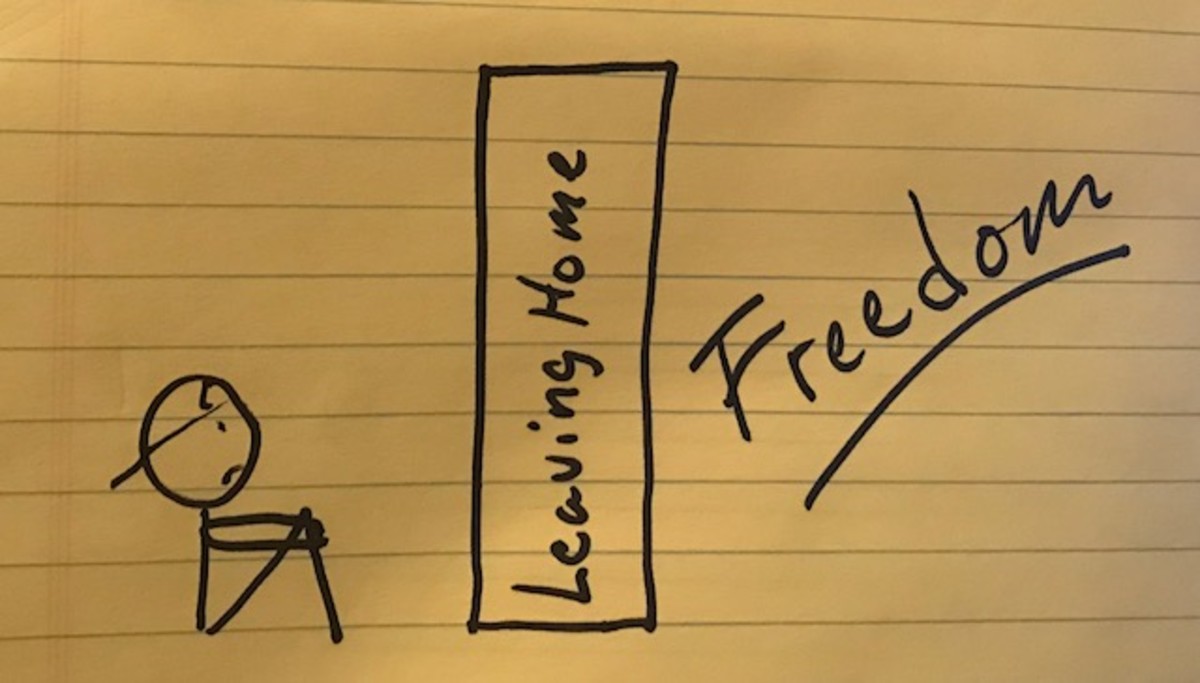When Parents Refuse To Let Go Of Their Near Adult and Young Adult Children

Parents: Your Adult Children Need to Establish Their Own Lives
It used to be that when people either became 18 or 21 years of age, they often left home to establish their own lives. Oftentimes, parents were extremely GLAD to have their children leave home. They wanted their children to leave their roost so they can live their lives unencumbered. Many children once they reach late adolescence and/or early adulthood could not wait to leave the parental home and live as they wished without parental rules.
Being independent and establishing a separate life from your parents are true hallmarks of adulthood. The definition of adulthood to the majority people is being independent, having a job, and living on one's own. Adults simply do not live with their parents and depend upon them psychologically, financially, and emotionally. The average parent actually look forward to the day that their children are on their own. Many parents feel that once this is done, they feel completely validated as parents.
However, yes, however, there are parents who are unwilling to let go of their near adult and young adult children! To reiterate--there are parents who refuse to let their children grow up! These parents often see their late adolescent and/or young adult children as children even though they are no longer children by definition. They insist on being in their late adolescent and/or young adult's lives although they are quite capable of making their own decisions. It is "very remarkable" how parents make major life decisions such as deciding what college their near adult children should attend or being present during their young adult children's job interview.
There are parents who confront their children's college professors and/or superiors if their children experiences academic and/or career difficulties. These parents believe that their late adolescent and/or young adult children are still children who should be taken care off. I remember a father of an 18 year old, stating that he should look out for his child. However, this child is almost an adult and should look out for herself. She is a child no longer but an adult.
There are parents who are quite fearful of their children becoming adults. They are very comfortable being in the dominant parental role while their children are in the submissive role. These parents believe that if their late adolescent and/or young adult children establish their own independent autonomy, they would not feel useful as parents. These parents contend that their near adult children should depend on them as long as possible. They feel very uncomfortable having near adult and/or adult children who are independent and autonomous.
Some parents want to feel important and intend to be parents as long as possible. These are the types of parents who do everything for their near adult and young adult children. It is these parents' mantra that they want everything to be as easy for their children as possible. These parents want their near adult and/or young adult children to experience a bucolic and stress free life. These parents maintain that difficulties would harm their children and do everything to avert this.
Many parents feel that they are good and/or excellent parents by being overly involved in their near adult and/or young adult children's lives in every aspect. There was a woman at my former place of employment who had a son in his twenties who graduated summa cum laude from a top college. She called him every three hours, telling him what job interview to go on, how to dress for a particular job interview,what type of career he should have, and how to network among other things. He even came to work, reporting his every move to her.
There are parents who do not want their young adult children to EVER move out. They are comfortable with their adult children living with them. This situation is totally abnormal. Adult children are supposed to live on their own. This is how they mature by gaining the prerequisite life skills from living independently and paying their own bills. Studies repeatedly confirm that adults who live on their own are more independent and successful than adults who still live with their parents. The average adult who lives with his/her parents is often unsuccessful in his/her career or have mediocre jobs. They also have poor life skills. They are indeed developmentally arrested in comparison to their more mature and independent peers.
Many parents seek to control their lives of their near adult and young adult children because they are fearful of relinquishing their parental role. Such parents often do not have lives and relationships other than their children. Their children are the alpha and omega in their lives. They sometimes have marital problems which they refuse to confront. Instead, they sublimate the energy that they can use to rectify their marriage by being overinvolved in the lives of their near adult and young adult children.
Many parents do not relate to themselves as a couple so they become overly involved in their children's lives. They do not know how to act as a couple. They are often afraid to let their near adult and/or young adult children be independent and live their own lives. They wish to hold on to their near adult and/or young adult children beyond the appropriate stage. These parents are afraid that if their near adult and.or young adult children live their independent lives, they have to make a readjustment to their lives as a couple.
Parents who are overinvolved in parenting their near adult and/or young adult children are doing a huge disservice to their children. Many near adult and/or young adult children of such parents become immature and infantilized, developing poor life and social skills. Such children develop little or no coping mechanisms and have low self-esteem. They also are very unsuccessful in their careers and are more likely to be fired from their jobs. They also have abysmally poor peer and romantic relationships. More sadly, when their parents die, they are often in very dire straights.
In conclusion, it used to be a rite of passage for near adult and/or young adult children to establish their independence from their parents. The average parents often look forward to the day their children are independent of them which validates their roles as parents. However, there are parents who adamantly refuse to let their near adult and/or young adult children to become independent.
Reasons for this range from being comfortable in the dominant parent-submissive child role lto being afraid to face life as a couple. Many parents keep their near adult and young adult children in perpetual childhood because they want their children to have as easy a life as possible. These parents do not want their children to be in any difficult situation. Such parents view their "children" as children no matter how old they are.
There are parents' whose lives revolve around their children. They either have marital problems and/or poor couple interfacing. Such parents have no friends, outside interests, and/or hobbies. Their children are the be all and end all to their universes. These parents are deathly afford to let their near adult and young adult children progress to independent adult status psychologically, emotionally, and financially.
Near adult and young adult children need their autonomy in order to become fully functioning adults. Parents who refuse to let go of their children are creating a very deleterious environment for them in terms of academic/career success and in terms of relationships, both platonic and romantic. Near adult and young adult children who are infantilized by their parents end up to be very unsuccessful adults who have poor survival and interfacing skills.









